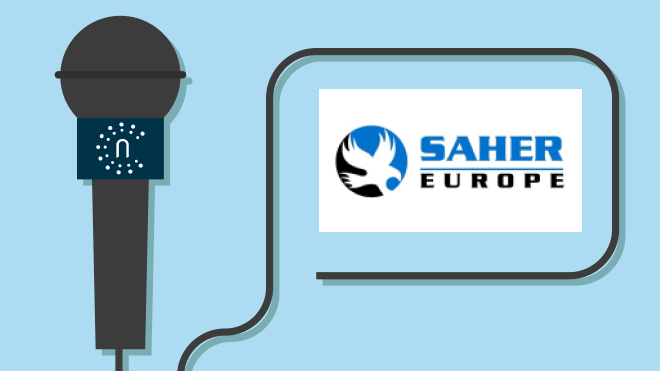
03 Nov The future role of HUMINT in the digital age
As intelligence gathering operations become increasingly complex, Andrew Staniforth, Director of Innovation at SAHER (Europe), explains exclusively to the NOTIONES network the future of traditional HUMINT in the digital age, and the importance of developing collaborative partnerships to develop intelligence disciplines.
What is your role and responsibility within the NOTIONES project?
As a security research and innovation consultancy based in Estonia but operating in the global intelligence industry, the primary role for SAHER has been to share our knowledge and expertise with other consortium partners.
We have developed a diverse security industry network over several years which provides unique access to a substantial global community of security industry leaders and innovators with a range of partners across public and private sectors including technical and engineering companies to government critical infrastructure authorities. This network offers unique opportunities for exploitation of innovations to the security and policing marketplace and is supporting the development of NOTIONES project outputs.
Our primary responsibility within NOTIONES to date has been contributing to the review of the activities performed by operational practitioners within the intelligence cycle. This has included supporting the understanding of their information needs and requirements. As SAHER personnel come from senior policing, academic and commercial backgrounds, thus blending practical strategic and operational policing and security research expertise with the knowledge of public bodies and private sector organisations, we are well placed to inform research on operational intelligence issues.
What has SAHER (Europe) delivered in the NOTIONES project so far?
Our focus has primarily supported the review of technologies and tools used in the security domain and to evaluate their utility for intelligence and security applications. We were assigned to review the thematic area of HUMINT. Our review, being supported by other consortium partners, covered the state-of-the-art of technologic advancements exploitable by intelligence and security practitioners. As part of our review, we included tools to support decision-making support and for the mitigation of cognitive biases and other limiting factors.
What is SAHER (Europe) contributing to the NOTIONES project?
Together with the added value we bring to the project from our team with policing and intelligence development expertise, we are contributing through providing access to our international network of law enforcement agencies across Europe. This network provides unique access to a substantial global community of police officers, police trainers and intelligence personnel with a rich and diverse range of local, regional, national and international agencies. As we are currently participating in other research and innovation actions, we have direct access to partners across Europe and beyond European borders. Our network offers NOTIONES unique dissemination and exploitation opportunities, and bespoke insights to capture critical end-user requirements.
We are participating in NOTIONES because it has a strong commitment to industrial collaboration and research and development. This also enables us to be aware of current and emerging technologies and exploit them in the marketplace, as well developing new training opportunities to ensure new technology is effectively integrated into current operational practices and procedures.
What expertise are you bringing to the NOTIONES project?
As a former counter-terrorism police detective with operational expertise in intelligence gathering and development, I bring over 25 years investigative experience. This acquired knowledge, when combined with my academic work and experience of the private security sector, brings a unique perspective to NOTIONES activities, especially where academic theory meets operational practice.
As a qualified teacher and a former police officer trainer, I have designed international multi-agency security exercise programmes and delivered counter-terrorism training to senior police commanders from across the world which brings important experience to the NOTIONES project activities. I am motivated by discovering new and innovative ways of working, whether this be the adoption of new technologies or equipment, or changes to culture, polices or operating practices to improve the provision of safety and security across Europe.
What are the challenges of HUMINT within the contemporary intelligence collection cycle?
It became clear to me during the HUMINT-related research for NOTIONES that advancements in technologies which support other intelligence disciplines has potentially diminished the standing and priority of HUMINT within the Intelligence Cycle. I therefore believe that more must be done to uncover the extent to which the value of HUMINT has been degraded over recent years in this age of high-technology surveillance and the use of social media providing a platform for instant mass communication and the proliferation of open-source intelligence (OSINT).
Although recent advances in technology and surveillance monitoring have made HUMINT more challenging, I believe that more must be done to ensure HUMINT remains viable in the digital age. The first step to achieving this would be for governments across Europe to review and revise their current HUMINT doctrine to meet their current and future strategic intelligence requirements. I would also advocate researching activities and analysing state-of-the-art technological advancements exploitable by intelligence and security practitioners in the field of HUMINT to amplify their potential application in the HUMINT discipline.
What is the mission of SAHER (Europe)? And how will your participation in the NOTIONES project support the development of SAHER (Europe)?
The mission of SAHER is to develop the intersection between the four key stakeholders in the international security domain including citizens, government intelligence and law enforcement agencies, industry, and academia.
Our aim is to provide a collaborative platform for professionals, policymakers, practitioners, and the public to advance international security innovations by encouraging and enhancing the development and delivery of innovative technologies, exposing them to the operational realities of policing and security.
This is the primary reason why the approach of NOTIONES is a great fit for SAHER as it provides opportunities to support public bodies and private sector organisations identify and implement innovative security technologies to maximise impact and positive outcomes.
How will NOTIONES make an impact upon the safety and security of Europe?
NOTIONES is successfully building a network of practitioners from security and intelligence agencies to support their needs for future security research programming. The NOTIONES activities and collaborative approach is creating new partnerships and serving to strengthen existing alliances, providing opportunities to share knowledge, expertise, and best practices.
From our perspective at SAHER, NOTIONES will help us to bridge the gap between security research and operational reality, focussing on new and emerging security threats. NOTIONES is providing SAHER with unique opportunities to build new partnerships with intelligence and law enforcement agencies so we can work towards increasing their knowledge, expertise and preparedness to better meet the security challenges that lie ahead.
Profile

To contact Andrew Staniforth please email: andy@saher-eu.com
To link with Andrew Staniforth please access: www.linkedin.com/in/andrew-staniforth-b1878019b
To learn more about SAHER (Europe) visit: https://saher-eu.com
Andrew Staniforth is Director of Innovation at SAHER Europe. As an international security and innovation expert, with extensive operational expertise in counterterrorism gained as an intelligence officer and counter-terrorism police detective, he has supported missions of the United Nations Terrorism Prevention Branch. As a qualified teacher, Andrew has designed international multi-agency security exercise programmes and has delivered counter-terrorism training to Senior Police Commanders from across the world. As a Senior Research Fellow and Visiting Lecturer, he has held academic positions at leading research institutes and is the author, co-author, editor, and co-editor of 12 security related books. Andrew is also a researcher at the Cyber Threats Research Centre (CYTREC) and a member of the Crisis Response Journal’s Advisory Panel, being a regular contributor of articles to leading defence, security and police publishers including Policing Insight.




